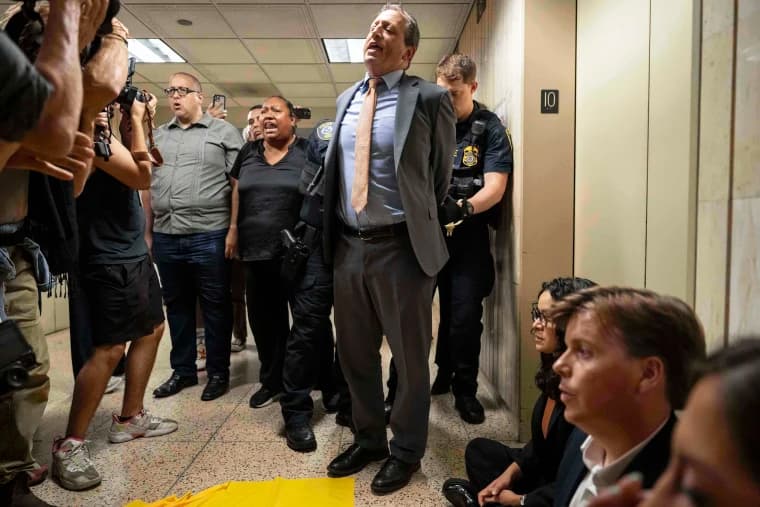We're loading the full news article for you. This includes the article content, images, author information, and related articles.
Decorated US military veterans in Congress express outrage over the alleged assault and detention of fellow veterans during protests against immigration policies, raising concerns about civil liberties and the use of force.

Several decorated United States military veterans serving in Congress have voiced strong condemnation following reports of US Immigration and Customs Enforcement (ICE) agents injuring and arresting military veterans during protests against deportation campaigns and the deployment of the National Guard in American cities. This development has ignited a debate on the treatment of peaceful protestors and the scope of federal law enforcement powers in the US.
Representative Jason Crow, a Democrat from Colorado and a former Army Ranger awarded the Bronze Star for his service in Iraq, emphasised the constitutional right to free speech, stating, "I went to war three times for this country to defend the right of Americans to say things I may not like. Now is the time for every American to speak out." Senator Tammy Duckworth, an Illinois Democrat and Purple Heart recipient after her helicopter was shot down in Iraq, echoed this sentiment, asserting that "No one – especially those who have already sacrificed so much for this country – should ever be assaulted, detained or thrown in solitary confinement for peacefully protesting government overreach."
The Guardian has documented at least eight instances where military veterans have faced prosecution or sought damages after being detained by federal agents. Two recent arrests occurred in late September outside an ICE facility in the Chicago area.
In one incident, 70-year-old Air Force veteran Dana Briggs was charged with assault after a video showed ICE agents advancing on him and knocking him over. Federal prosecutors allege Briggs "made physical contact with an agent's arm while the agent attempted to extend the safety perimeter." Briggs, who pleaded not guilty, was released on an appearance bond. His charges were later downgraded to a misdemeanor.
Another Afghanistan war veteran, John Cerrone, was reportedly tackled by a group of ICE agents, detained for nine hours in solitary confinement, and charged with disorderly conduct. A Department of Homeland Security (DHS) spokesperson claimed Cerrone had thrown back a teargas canister earlier in the day. Cerrone plans to contest the misdemeanor citation.
ICE, established under the Department of Homeland Security in 2003, is tasked with enforcing immigration laws, conducting criminal investigations, and preserving national security and public safety. Its mandate includes identifying, apprehending, detaining, and removing undocumented immigrants. However, critics argue that under the current administration, ICE has been accused of civil rights abuses and acting as a tool of intimidation.
Senator Duckworth has challenged the Trump administration's justifications for using excessive force, stating that their "meritless claims... simply aren't supported by evidence, and even federal judges are recognizing they are not credible or 'tethered to facts'."
Jose Vasquez, a former US Army staff sergeant and executive director of the progressive veterans' organisation Common Defense, which counts Briggs as a member, stated that veterans are protesting because they "recognize a pattern of state-sanctioned abuse." Demi Palecek, an Illinois Army National Guard member, criticised ICE agents' training, noting, "As a military member, I can tell you – the way they handle weapons is reckless and dangerous."
The incidents have sparked broader concerns about the militarisation of domestic law enforcement and the protection of constitutional rights. The use of federal agents against peaceful protestors, particularly veterans, raises questions about the balance between national security and civil liberties.
The full extent of injuries sustained by veterans during these protests remains unclear, as does the precise number of veterans who have been arrested or faced charges nationwide. The long-term implications of these confrontations on public trust in federal agencies and the relationship between veterans and the government are also yet to be fully understood.
The ongoing legal proceedings against Dana Briggs and John Cerrone will be closely watched, as will any further legislative action or policy changes regarding the deployment of federal agents in response to protests. The debate surrounding immigration enforcement and civil liberties is expected to continue, with potential implications for future demonstrations and government responses.
Keep the conversation in one place—threads here stay linked to the story and in the forums.
Sign in to start a discussion
Start a conversation about this story and keep it linked here.
Other hot threads
E-sports and Gaming Community in Kenya
Active 9 months ago
The Role of Technology in Modern Agriculture (AgriTech)
Active 9 months ago
Popular Recreational Activities Across Counties
Active 9 months ago
Investing in Youth Sports Development Programs
Active 9 months ago